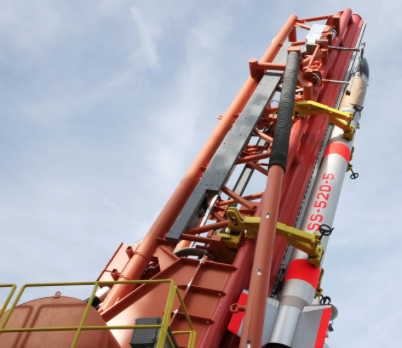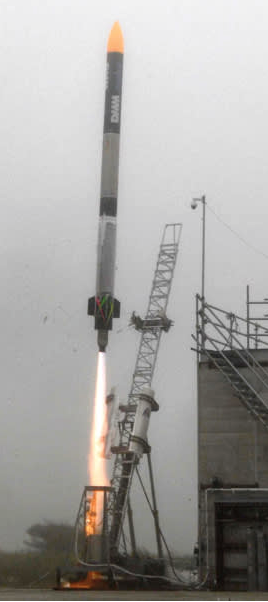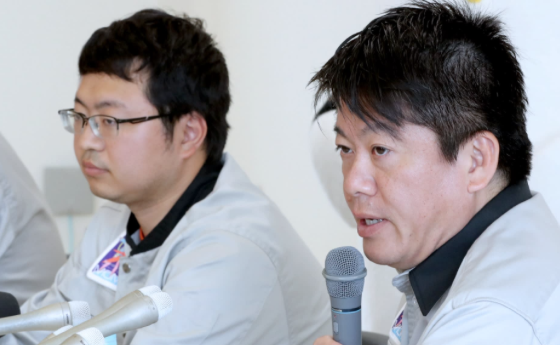Monday's announcement comes just a few days after a domestic rival suffered a fiery failure in a test launch, highlighting how Japanese companies are light-years behind international peers in this field.
TOKYO — Japanese minirocket venture Space One plans to begin commercial launches of satellites in the fiscal year ending March 2022, as the increasingly crowded field of private-sector space development focuses on smaller vehicles to cut costs.
Monday's announcement comes just a few days after a domestic rival suffered a fiery failure in a test launch, highlighting how Japanese companies are light-years behind international peers in this field.
Canon Electronics, IHI Aerospace, Shimizu and Development Bank of Japan established New Generation Small Rocket Development Planning in August 2017. The four partners marked their updated mission Monday by rebranding the unit as Space One.

JAXA launched the SS-520-5 minirocket in February. (Photo by Kosaku Mimura)
The quartet sent Space One's capitalization soaring to 1.4 billion yen ($12.6 million) from just 100 million yen through private placements of new shares. The unit of Canon holds a 50 percent stake, while the ownership ratios of the other three partners have not been disclosed.
In developed countries, the creation of rockets for satellite launches has shifted steadily into private hands from the public sector. In Japan, companies such as Mitsubishi Heavy Industries have been involved in launching conventional heavy rockets.
But the cost of one launch with a large rocket can top $100 million. A minirocket slashes the price to hundreds of millions of yen. Space One's vehicle will measure roughly a dozen meters in length, or about one-fifth the size of Japan's mainstay rockets.
In the U.S., some companies launch satellites for $5 million. "We would like to set a price that cannot lose to the competition," Space One President Shinichiro Ota said.
Space One's partners bring knowledge built from their experience in the space industry. Canon Electronics and IHI Aerospace helped develop the SS-520 minirocket for the Japan Aerospace Exploration Agency. JAXA successfully launched the vehicle in February.

The Momo's flight lasted barely more
than a minute.
U.S. aerospace engineering firm SpaceWorks Enterprises estimates that demand for minisatellite launches will reach 460 in 2023, up 360 percent from the 2016 figure. New applications for satellites — such as farming, fisheries and container shipping — drive this expected surge. Satellites previously were used mainly for defense and space exploration.
Large rockets often need multiple satellites as payload to justify the cost of one launch. India broke a record last year by launching 104 nanosatellites with a single rocket. Recruiting that number of clients can take a year or more, however.
A minirocket launch can be profitable even for one satellite. Space One aims to put 20 satellites into orbit annually by the mid-2020s, with each launch occurring within a year of the contract being signed.
But the Japanese joint venture must play catch-up with international rivals. Rocket Lab put a satellite into orbit with its vehicle in January. The American company, formed in 2006, is considered a unicorn — an unlisted business worth more than $1 billion.
China's One Space Chongqing, established in 2015, conducted a trial launch in May. This business raised copious funds from both venture capital and state largesse.
However, Japan has yet to put a privately built rocket into space. When Interstellar Technologies first launched its MOMO rocket in July 2017, the flight was marred by communications failure, causing the craft to land in the sea without escaping Earth's atmosphere.

Takafumi Horie, who founded Interstellar Technologies, speaks at a press conference after the rocket, MOMO-2, exploded shortly after liftoff in Taiki, Hokkaido on June 30.
The company tried again Saturday, but the rocket crashed and burned just seconds after the countdown. Interstellar Technologies plans to continue, possibly with the same launch pad since it appeared to sustain no damage.
Elon Musk's SpaceX, the leader in low-cost rocketry, suffered embarrassing failures in its early history as well. Rocket Lab was forced to postpone a launch first slated for April due to technical problems.
But the race to capture the commercial space development market continues to heat up. SpaceX has come out ahead in the development of reusable rockets. Mitsubishi Heavy is working with JAXA to develop rocket technology that halves the costs of liftoffs. They are competing in that field with Arianespace, the European satellite launch company.
by Shoji Yano and Fumie Yaku, Nikkei staff writers

